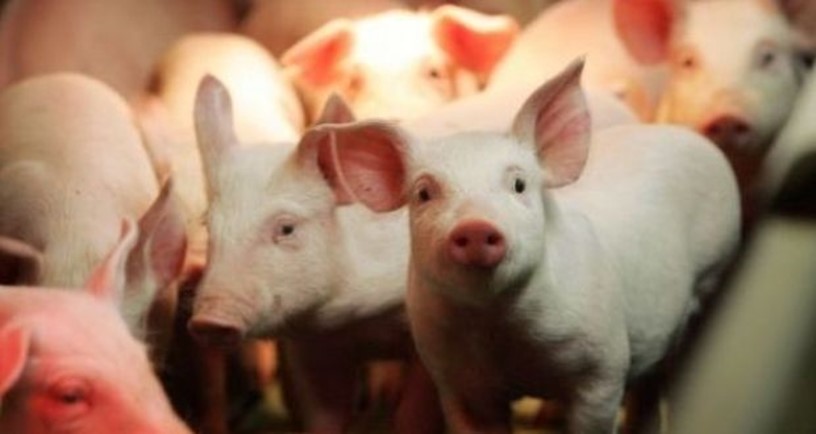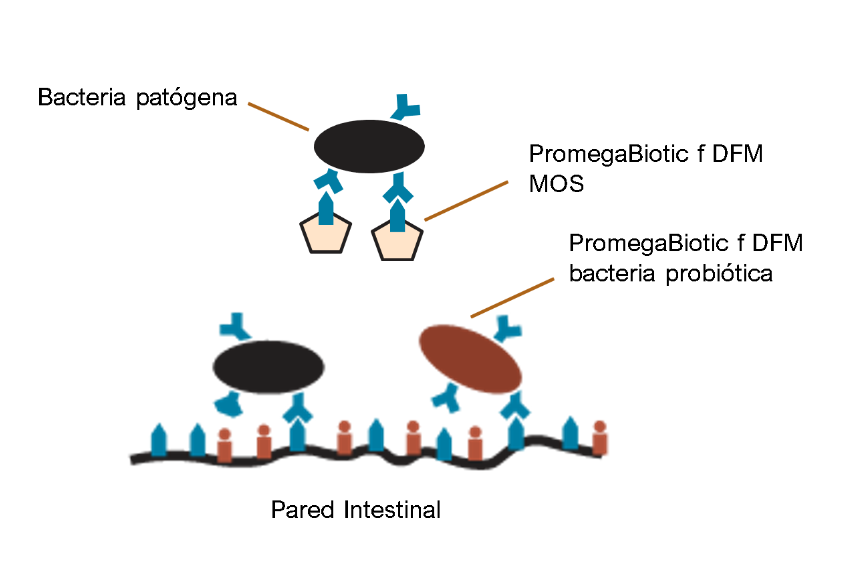PromegaBiotic-f® DFM Probiotic Treatment for Swine Feed
PromegaBiotic-f® DFM contains a combination of enzymes and concentrated viable culture preparations of Saccharomyces cerevisiae, Bacillus licheniformis, Bacillus subtilis and Enterococcus faecium.
PRODUCT BENEFITS
Beneficial bacteria play an important role in poultry by:
- Ensuring optimal pH conditions for endogenous enzyme function, thus providing an optimal environment for feed digestion;
- Producing growth factors that stimulate the growth of beneficial bacteria such as Bifidobacteria;
- Protecting the gastrointestinal tract by producing antibacterial substances that inhibit the proliferation of pathogens;
- Stimulating normal intestinal development by producing volatile fatty acids;
- Promoting gastrointestinal health by preventing pathogen colonization and stimulating the development of immunity.


MECHANISMS OF ACTION
PromegaBiotic-f® DFM has been shown to have a higher pathogen-binding capacity than the leading competitor product, MOS. Therefore, fewer pathogens colonize the gastrointestinal tract, thus maintaining a healthier intestinal ecosystem;
- Beneficial modulation of the immune system, resulting in increased immunoglobulin synthesis and improved and more persistent titer levels after vaccination;
- Improved animal performance. Less energy is spent repairing the gastrointestinal tract and treating stress induced by pathogen proliferation;
- Improved intestinal health results in longer villi and thinner gastrointestinal membranes. This provides a greater surface area for nutrient absorption and reduces the barrier to nutrients entering the bloodstream from the intestine.
PromegaBiotic-f® DFM is a probiotic derived from the cell wall of a single source of Saccharomycees cerevisiae (MOS). The polysaccharides obtained from the yeast cell wall are composed of glucans, mannans, chitins, and galactans. Glucans are a group of d-glucose polymers with glycosidic bonds and 1,3- and 1,6-linkages. It also contains the probiotics Bacillus subtilis, Bacillus licheniformis, and Enterococcus faecium.
|
Enterococcus faecium is an important bacterium for the health of the lower gastrointestinal tract. Beneficial bacteria help modulate the pH of the lower gastrointestinal tract, thus creating an optimal environment for endogenous enzymes to process feed efficiently. An additional benefit is that these bacteria produce bacteriocins that inhibit the growth of E. coli, Salmonella, and Clostridia. Bacillus licheniformis are facultative anaerobes that produce a variety of enzymes, including urease, protease, amylase, cellulase, and lipase. Bacillus subtilis are aerobes that produce a variety of enzymes with very good activity, such as protease, amylase, lipase, esterase with some xylanase activity, and cellulase. The enzymes produced by Bacillus strains help improve feed efficiency and feed conversion. Saccharomyces cerevisiae is an important probiotic organism that helps modulate the pH of the caecum and colon, as well as stimulate the growth of beneficial bacteria. This results in an increase in the number of beneficial bacteria in the caecum and colon, improved feed conversion, and a reduction in the frequency of constipation in sows. Several enteric pathogens have MOS binding sites that are used to adhere to intestinal villi. The MOS present in PromegaBiotic-f® DFM acts as a decoy to which these pathogens adhere and are then eliminated from the gastrointestinal tract.
|
INSTRUCTIONS FOR USEIncluded in feed at a rate of:
Added to drinking water:
INGREDIENTSYeast cultures, Saccharomyces cerevisiae, Bacillus licheniformis, Enterococcus faecium, Bacillus subtilis, fermentation products, free enzymes and vehicle. GUARANTEED ANALYSISViable yeast: minimum 1.8 x 1012 cells/kg. Total microbial count: minimum 2.5 x 1012 CFU/kg. STORAGE
Shelf lifeTwo years if stored as recommended. PackingIn plastic containers with safety lids containing 10kg or 20kg or bags with 1kg each or bags with 250g each.
DISTRIBUTED IN ARGENTINA BY: BEDSON S.A. Las Palmeras 2240, R8 km 47,50, La Lonja, +54 230 447-0249
|
